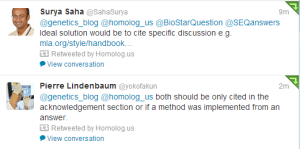
Citing BioStar and SeqAnswers Papers Does not Make Sense
This odd Twitter request is a good example of how 40 years of government funding destroyed 400 years of scientific traditions.

Historically, the practice of citation was followed by scholars so that intellectual contributions of other scholars were proper credited. Plagiarism meant not giving proper credit to other scholars for their intellectual work. For example, Newton accused Leibniz of plagiarism, because he thought Leibniz’s theory of calculus was inspired by his own.
The last years of Leibniz’s life, 17091716, were embittered by a long controversy with John Keill, Newton, and others, over whether Leibniz had discovered calculus independently of Newton, or whether he had merely invented another notation for ideas that were fundamentally Newton’s. Newton manipulated the quarrel. The most remarkable aspect of this barren struggle was that no participant doubted for a moment that Newton had already developed his method of fluxions when Leibniz began working on the differential calculus. Yet there was seemingly no proof beyond Newton’s word. He had published a calculation of a tangent with the note: “This is only a special case of a general method whereby I can calculate curves and determine maxima, minima, and centers of gravity.” How this was done he explained to a pupil a full 20 years later, when Leibniz’s articles were already well-read. Newton’s manuscripts came to light only after his death.
Ever since academics sold their journals to commercial entities, plagiarism became synonymous to copyright violation and citation turned into a method to make claims for government funding. We can give three good examples, where US National Academy members or alike knowingly plagiarized our prior work to rewrite history.
BioStar and SeqAnswers are very helpful tools, but they are communication media to bring people together. Is it appropriate to cite BioStar or SeqAnswers papers merely because of their utility? We see three problems.
A. Should a researcher cite his colleague instead of Einstein for theory of relativity, because his colleague explained the theory to him in simple language?
B. Should a student cite the charter of his university or an academic conference for theory of relativity, because those two venues helped him meet smart people and bridge gaps in his understanding?
C. Should we cite Google hangout for coelacanth paper and ftp program for being able to download human genome?
We presume the primary motivation for getting the BioStar and SeqAnswers papers cited is to allow them to get government funding. Given how useful those online tools are, biologists and bioinformaticians have a golden opportunity to ask government bureaucrats so that funding rules are brought to the internet age.
-——————
Edit.
Needless to say, others disagree.


